This is the final blog in a four-part series on the Postsecondary State Career Technical Education Leaders Fellowship at Advance CTE – Sponsored by ECMC Foundation (The Fellowship)
Overview
The Carl D. Perkins Career and Technical Education Act (Perkins V*) includes provisions focused on providing access to and success in Career Technical Education (CTE) programs for members of special populations and subgroups, including major racial ethnic groups in each state. States are fulfilling these requirements in various ways. Below are a few examples of how states are applying an equity-minded lens to administrative policies and practices to improve CTE ecosystems by emphasizing equitable access to and learner performance in CTE programs.
Ohio
 Administration of a CTE program with an equity lens begins with ensuring all learners have meaningful access to and substantial engagement in high-quality CTE programming which requires making these actions a priority. Ohio has created and applied equity-minded leadership principles within several initiatives, leveraging funds and resources to provide local administrators with supports to develop and sustain equitable practices and policies.
Administration of a CTE program with an equity lens begins with ensuring all learners have meaningful access to and substantial engagement in high-quality CTE programming which requires making these actions a priority. Ohio has created and applied equity-minded leadership principles within several initiatives, leveraging funds and resources to provide local administrators with supports to develop and sustain equitable practices and policies.
- Perkins V Reserve Fund – Equity for Each competitive grant
- Ohio offers competitive grants, funded through its Perkins reserve fund, to local education agencies and postsecondary institutions to assist recipients with “identifying and promoting promising practices for improving equity in CTE delivery for students in special population groups and subgroups.” The grants prioritize collaboration between secondary and postsecondary institutions, the implementation of strategies to support programs of study aligned to high-skill, in-demand or high-wage occupations and improving data-identified equity gaps in access to and performance in CTE programs.
- Equity Ambassador Program
- Individuals work to improve equity in CTE and are deployed throughout the state after being provided with professional development facilitated by the Ohio Department of Education’s Office of Career Technical Education.
- Perkins V Equity Labs
- Regionally offered to CTE administrators and instructors from each of the state’s CTE Planning Districts including participation by the Equity Ambassadors, the lab sessions provided each district with an Equity Data Report. Participants use the provided data to complete activities such as setting achievable goals, collaborating on best practices and sharing resources to improve equitable supports for learners in Ohio’s CTE programs.
Indiana
 The application of equity-minded principles isn’t a one-time occurrence. It requires an ongoing systematic review of policies, practices and data to determine the effectiveness of the mitigating or transformational strategies being applied. Indiana engaged in this process by conducting a review of the CTE equity labs being offered in their state and using additional resources to measure goal attainment and to provide additional supports to local leaders.
The application of equity-minded principles isn’t a one-time occurrence. It requires an ongoing systematic review of policies, practices and data to determine the effectiveness of the mitigating or transformational strategies being applied. Indiana engaged in this process by conducting a review of the CTE equity labs being offered in their state and using additional resources to measure goal attainment and to provide additional supports to local leaders.
The state’s CTE team participated in equity lab debriefing sessions to improve their messaging on equity and access, awareness of using inclusive language and overall effectiveness of equity labs currently being offered with the assistance of the Great Lakes Equity Center. This work coincided with Indiana’s participation in the CTE Opportunity Gap Analysis Train-the-Trainer Workshop offered by Advance CTE. The workshop’s six months of community of practice monthly sessions conducted with nine states included completing one in-state workshop with workshop specific resources designed to support state leaders in examining their current policies and practices.
What’s Next
This blog series is a precursor to a forthcoming state CTE leadership pipeline toolkit due to be released in Fall 2023. The toolkit will provide a “plug and play” roadmap for states to use to create their own initiative to strengthen and diversify an equity-minded state leadership pipeline. The toolkit will draw upon Advance CTE’s experiences with facilitating the Fellowship and lift up vetted resources and techniques for states to apply.
For additional support, check out Advance CTE’s resource Engaging Representatives of Learners with Special Population Status Through Perkins V.
*As amended by the Strengthening Career and Technical Education for the 21st Century Act
Dr. Kevin Johnson, Senior Advisor
View previous blogs in this series:
Blog 2: Advancing Equity in CTE: A Review on the Current State of CTE Leadership Programs
Blog 3: Advancing Equity in CTE: The Equity-Minded Leadership Framework
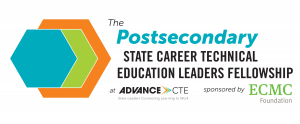


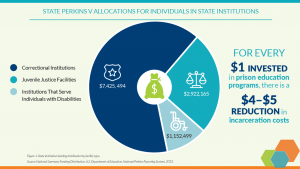
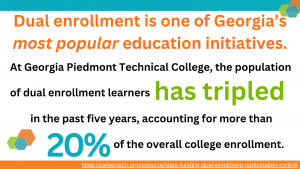
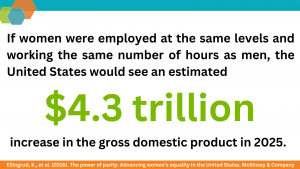

 In the coming months, Advance CTE will release a series of four briefs to share strategies put in place by the PDI states to advance postsecondary CTE data quality and use. The first brief explores how postsecondary CTE data can be used in support of state education and workforce goals, and features
In the coming months, Advance CTE will release a series of four briefs to share strategies put in place by the PDI states to advance postsecondary CTE data quality and use. The first brief explores how postsecondary CTE data can be used in support of state education and workforce goals, and features  The second brief advances a theory of change for centering learners in postsecondary CTE data collection and use, featuring the
The second brief advances a theory of change for centering learners in postsecondary CTE data collection and use, featuring the 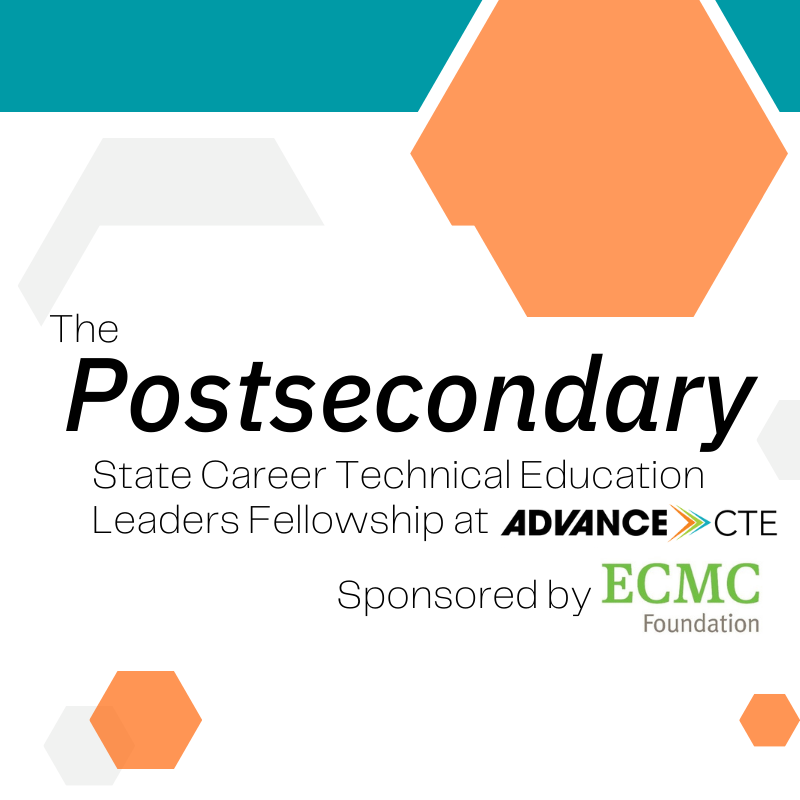 The Postsecondary State CTE Leaders Fellowship at Advance CTE – Sponsored by ECMC Foundation is intended to build a talent pipeline of state-level postsecondary Career Technical Education (CTE) leaders fiercely committed to creating an accessible and racially just postsecondary state CTE system. Through the
The Postsecondary State CTE Leaders Fellowship at Advance CTE – Sponsored by ECMC Foundation is intended to build a talent pipeline of state-level postsecondary Career Technical Education (CTE) leaders fiercely committed to creating an accessible and racially just postsecondary state CTE system. Through the